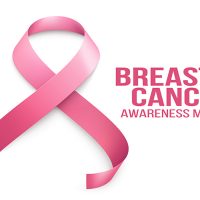
Cancer is a disease in which cells in the body grow out of control. When cancer starts in the breast, it is called breast cancer. Except for skin cancer, breast cancer is the most common cancer in American women.
Breast cancer screening means checking a woman’s breasts for cancer before she has any symptoms. A mammogram is an X-ray picture of the breast. Mammograms are the best way to find breast cancer early, when it is easier to treat and before it is big enough to feel or cause symptoms.
Most women who are 50 to 74 years old should have a screening mammogram every two years. If you are 40 to 49 years old, or think you may have a higher risk of breast cancer, ask your doctor when to have a screening mammogram.
Some things may increase your risk
The main factors that influence your breast cancer risk are being a woman and getting older. Other risk factors include—
• Changes in breast cancer-related genes (BRCA1 or BRCA2).
• Having your first menstrual period before age 12.
• Never giving birth, or being older when your first child is born.
• Starting menopause after age 55.
• Taking hormones to replace missing estrogen and progesterone
in menopause for more than five years.
• Taking oral contraceptives (birth control pills).
• A personal history of breast cancer, dense breasts, or some other
breast problems.
• A family history of breast cancer (parent, sibling, or child).
• Getting radiation therapy to the breast or chest.
• Being overweight, especially after menopause.
Symptoms
Some warning signs of breast cancer are—
Other conditions can cause these symptoms. If you have any signs that worry you, call your doctor right away.
• New lump in the breast or underarm (armpit).
• Thickening or swelling of part of the breast.
• Irritation or dimpling of breast skin.
• Redness or flaky skin in the nipple area or the breast.
• Pulling in of the nipple or pain in the nipple area.
• Nipple discharge other than breast milk, including blood.
• Any change in the size or the shape of the breast.
• Pain in the breast.
To learn more,call (800) CDC-INFO.
Information provided by www.cdc.gov/cancer/breast/

